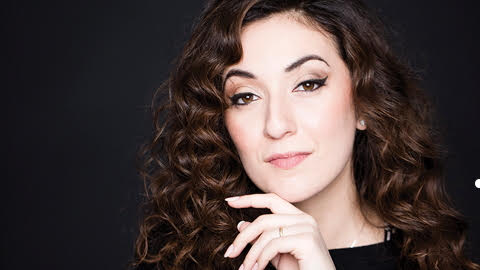Soprano Rosa Feola makes radiant Washington debut with Vocal Arts DC

Washington had its first chance to hear Rosa Feola on Friday night. Presented by Vocal Arts DC in the Kennedy Center Terrace Theater, the fast-rising Italian soprano performed a concise selection of art songs in Italian. She and her musical partner, pianist Iain Burnside, recorded most of these pieces on her first solo album, released on the Opus Arte label in 2015.
Among bodies of national art song, the Italian is the most maligned, often dismissed as a pale imitation of its operatic repertoire. With the mellifluous beauty of her lyric soprano voice, so polished and balanced from top to bottom, and consummate clarity of diction, Feola brought this music vividly into the best light.
The opening three songs set the tone of reclamation: Tre pezzi by Giuseppe Martucci, an Italian composer from the turn of the 20th century who eschewed opera to focus on instrumental music and art song. Setting enigmatic poetry by Giosuè Carducci, the first Italian to win the Nobel Prize in Literature, these songs challenged principally in their complex accompaniments.
At the keyboard Burnside meandered through countless chromatic deflections in “Maggiolata” and evoked the creepy presence of death through the ominous, tolling pedal notes in “Nevicata.” Feola treated each song as a sort of dramatic scena, elucidated with gestures, stances, and facial expressions outlining each narrator’s character.
Ottorino Respighi once studied with Martucci and like him often looked back to forms predating the advent of opera in Italy. His Quattro Rispetti toscani are reminiscent of folk songs and medieval poetry. The melodic simplicity could become tiresome in a lesser voice, but Feola held attention with an exquisite legato line and perfectly placed and sustained high notes, as at the end of the lullaby “Venitelo a vedere il mio piccino“ and of the lament “Viene di là, lontan lontano.”
Burnside provided dramatic details in the accompaniment, especially the chromatic patterns evoking the blowing wind in “Viene di là, lontan lontano,” as well as the clucking and scratching of the farmyard chickens in “Razzolan, sopra l’aja, le galline.” The latter song offered much-needed comic lightness, with Feola skilfully negotiating the more challenging melismatic runs representing the spirited peasant girl trying to get a shy man to talk to her.
Rossini composed the three songs of La regata veneziana among his late Péchés de vieillesse. Feola again brought the narrator of the songs, Anzolata, to life with charming declamation and dramatic sensibility as she encouraged her beloved rower to win a prize in a Venetian boat race. The greatest challenges fell to Burnside at the piano, not least the constant stream of parallel thirds in “Anzoleta co passa la regata,” like the agitated ripples in the wake of the racing boats.
The rather short program was extended by the addition of Amilcare Ponchielli’s “Sonetto di Dante: Tanto gentile e tanto onesta pare” before the final set. A slow tempo and undulating phrasing brought out the sentimental side of the song, capped by a sighed high A, clear and without tension, at the climax.
Liszt’s Three Sonnets by Petrarch, composed during a long stay in Italy, provided the evening’s greatest drama. Feola easily negotiated the choppy starts and stops in “Pace non trovo,” assisted by Burnside in assiduously applied freedom with the tempo. These pieces featured the top end of Feola’s vocal range, as at the ecstatic C-flat that crowns the poem at the words “ed amo altrui” (but I love another).
Feola did not take the optional D-flats in the first two songs in the set, but that C-flat and the high B in “Benedetto sia ‘l giorno” were high points in an evening without any weak links. Underscoring the operatic nature of these art songs was the single encore, the aria “Signore, ascolta!” sung by Liù in Puccini’s Turandot. Capped by a stupendous, breath-taking crescendo on the piece’s final note, this music felt very much of a piece with the rest of the program.
Vocal Arts DC presents mezzo-soprano Sasha Cooke and pianist Julius Drake in music by Beethoven and Schumann 7:30 p.m. February 17. vocalartsdc.org; 202-669-1463


